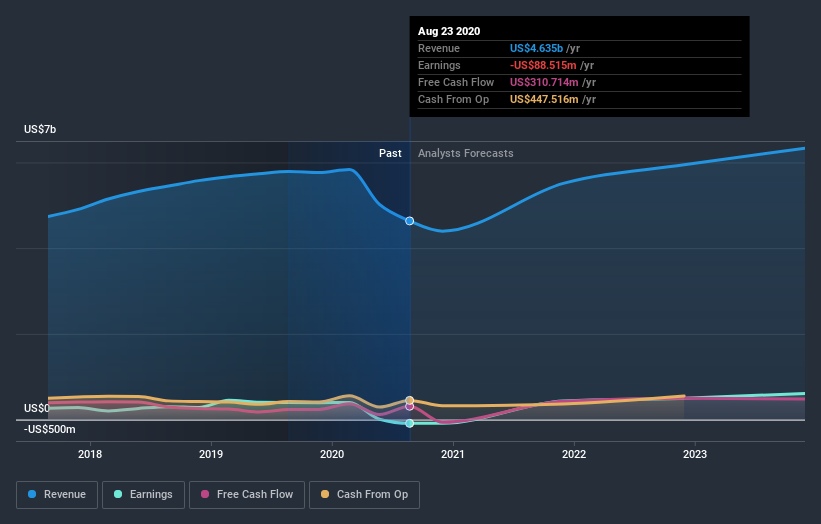- United States
- /
- Luxury
- /
- NYSE:LEVI
Is Levi Strauss & Co.'s (NYSE:LEVI) Shareholder Ownership Skewed Towards Insiders?
The big shareholder groups in Levi Strauss & Co. (NYSE:LEVI) have power over the company. Generally speaking, as a company grows, institutions will increase their ownership. Conversely, insiders often decrease their ownership over time. I quite like to see at least a little bit of insider ownership. As Charlie Munger said 'Show me the incentive and I will show you the outcome.
Levi Strauss has a market capitalization of US$8.2b, so it's too big to fly under the radar. We'd expect to see both institutions and retail investors owning a portion of the company. Our analysis of the ownership of the company, below, shows that institutions are noticeable on the share registry. We can zoom in on the different ownership groups, to learn more about Levi Strauss.
View our latest analysis for Levi Strauss

What Does The Institutional Ownership Tell Us About Levi Strauss?
Institutional investors commonly compare their own returns to the returns of a commonly followed index. So they generally do consider buying larger companies that are included in the relevant benchmark index.
We can see that Levi Strauss does have institutional investors; and they hold a good portion of the company's stock. This can indicate that the company has a certain degree of credibility in the investment community. However, it is best to be wary of relying on the supposed validation that comes with institutional investors. They too, get it wrong sometimes. It is not uncommon to see a big share price drop if two large institutional investors try to sell out of a stock at the same time. So it is worth checking the past earnings trajectory of Levi Strauss, (below). Of course, keep in mind that there are other factors to consider, too.

Hedge funds don't have many shares in Levi Strauss. Miriam Haas is currently the largest shareholder, with 11% of shares outstanding. With 9.5% and 8.8% of the shares outstanding respectively, Robert Haas and Margaret Haas are the second and third largest shareholders. Additionally, the company's CEO Charles Bergh directly holds 2.8% of the total shares outstanding.
We also observed that the top 7 shareholders account for more than half of the share register, with a few smaller shareholders to balance the interests of the larger ones to a certain extent.
While studying institutional ownership for a company can add value to your research, it is also a good practice to research analyst recommendations to get a deeper understand of a stock's expected performance. There are plenty of analysts covering the stock, so it might be worth seeing what they are forecasting, too.
Insider Ownership Of Levi Strauss
The definition of an insider can differ slightly between different countries, but members of the board of directors always count. Company management run the business, but the CEO will answer to the board, even if he or she is a member of it.
Most consider insider ownership a positive because it can indicate the board is well aligned with other shareholders. However, on some occasions too much power is concentrated within this group.
Our most recent data indicates that insiders own the majority of Levi Strauss & Co.. This means they can collectively make decisions for the company. That means insiders have a very meaningful US$5.4b stake in this US$8.2b business. It is good to see this level of investment. You can check here to see if those insiders have been selling any of their shares.
General Public Ownership
With a 12% ownership, the general public have some degree of sway over Levi Strauss. While this group can't necessarily call the shots, it can certainly have a real influence on how the company is run.
Next Steps:
I find it very interesting to look at who exactly owns a company. But to truly gain insight, we need to consider other information, too. Be aware that Levi Strauss is showing 3 warning signs in our investment analysis , and 1 of those doesn't sit too well with us...
Ultimately the future is most important. You can access this free report on analyst forecasts for the company.
NB: Figures in this article are calculated using data from the last twelve months, which refer to the 12-month period ending on the last date of the month the financial statement is dated. This may not be consistent with full year annual report figures.
When trading Levi Strauss or any other investment, use the platform considered by many to be the Professional's Gateway to the Worlds Market, Interactive Brokers. You get the lowest-cost* trading on stocks, options, futures, forex, bonds and funds worldwide from a single integrated account. Promoted
New: AI Stock Screener & Alerts
Our new AI Stock Screener scans the market every day to uncover opportunities.
• Dividend Powerhouses (3%+ Yield)
• Undervalued Small Caps with Insider Buying
• High growth Tech and AI Companies
Or build your own from over 50 metrics.
This article by Simply Wall St is general in nature. It does not constitute a recommendation to buy or sell any stock, and does not take account of your objectives, or your financial situation. We aim to bring you long-term focused analysis driven by fundamental data. Note that our analysis may not factor in the latest price-sensitive company announcements or qualitative material. Simply Wall St has no position in any stocks mentioned.
*Interactive Brokers Rated Lowest Cost Broker by StockBrokers.com Annual Online Review 2020
Have feedback on this article? Concerned about the content? Get in touch with us directly. Alternatively, email editorial-team (at) simplywallst.com.
About NYSE:LEVI
Levi Strauss
Designs, markets, and sells apparels and related accessories for men, women, and children in the United States and internationally.
Outstanding track record with flawless balance sheet.
Similar Companies
Market Insights
Community Narratives




